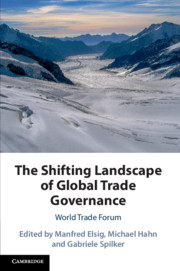Book contents
- The Shifting Landscape of Global Trade Governance
- The Shifting Landscape of Global Trade Governance
- Copyright page
- Contents
- Figures
- Tables
- Contributors
- Preface
- Abbreviations
- 1 Introduction
- Part I New and Old Challenges
- Part II Trade Policy and Trade-Related Concerns
- 7 Reconceiving Trade Agreements for Social Inclusion
- 8 Our Alarming Climate Crisis Demands Border Adjustments Now
- 9 The Multilateralization of PTAs’ Environmental Clauses
- 10 The Trend to More and Stricter Non-Trade Issues in Preferential Trade Agreements
- Part III Development Angles
- Part IV Diffusion across Economic Treaties
- Index
- References
7 - Reconceiving Trade Agreements for Social Inclusion
from Part II - Trade Policy and Trade-Related Concerns
Published online by Cambridge University Press: 05 August 2019
- The Shifting Landscape of Global Trade Governance
- The Shifting Landscape of Global Trade Governance
- Copyright page
- Contents
- Figures
- Tables
- Contributors
- Preface
- Abbreviations
- 1 Introduction
- Part I New and Old Challenges
- Part II Trade Policy and Trade-Related Concerns
- 7 Reconceiving Trade Agreements for Social Inclusion
- 8 Our Alarming Climate Crisis Demands Border Adjustments Now
- 9 The Multilateralization of PTAs’ Environmental Clauses
- 10 The Trend to More and Stricter Non-Trade Issues in Preferential Trade Agreements
- Part III Development Angles
- Part IV Diffusion across Economic Treaties
- Index
- References
Summary
This chapter first characterizes the fundamental purposes of the WTO and trade agreements, which should be viewed as much broader than trade liberalization. It then presents the major challenges that the trade system now faces. Special emphasis is paid to technological change since the WTO was created in 1995, namely, the development of global value chains. Finally, the author contends that trade agreements, in response, must be designed and conditioned upon social policy commitments. They should include, or be conditioned upon, agreements that cover: coordinated tax policy to combat harmful tax competition, tax avoidance, and tax evasion; domestic social security and job retraining, supported by trade adjustment commitments; labor protection; protections against social dumping; and accommodation of industrial policy experimentation for development. It will not be an easy process to reconceive trade agreements to better ensure social inclusion through these means, but the current system otherwise could unravel.
- Type
- Chapter
- Information
- The Shifting Landscape of Global Trade GovernanceWorld Trade Forum, pp. 157 - 181Publisher: Cambridge University PressPrint publication year: 2019
References
- 3
- Cited by

